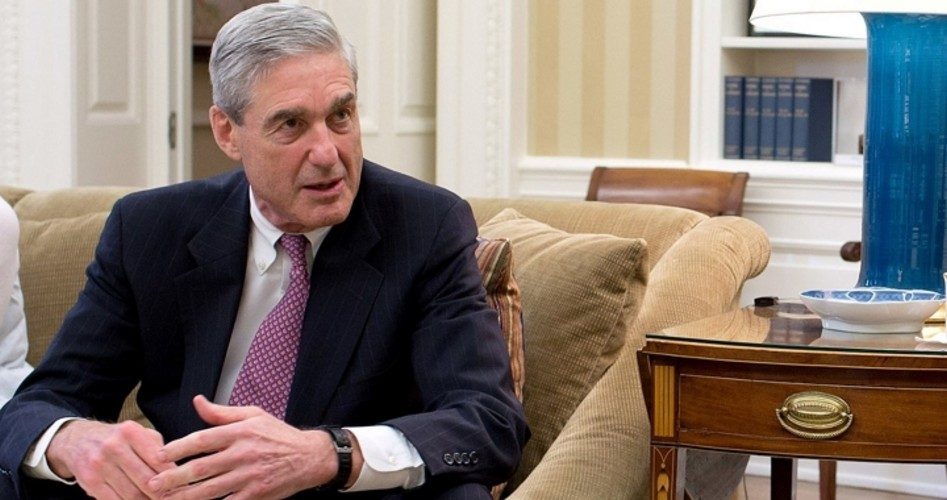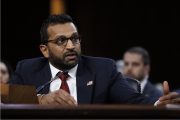
When a Senate committee sent investigators to question an FBI informant who had been in association with two 9/11 hijackers, then-FBI director Robert Mueller objected.
A lawsuit filed by families of the victims of the 9/11 terrorist attacks against the government of Saudi Arabia charges that the Saudi government had funded a “dry run” designed to test airline security. (See our article on the subject here.) Amazingly, however, when the Joint Inquiry Into Intelligence Activities Before and After the Terrorist Attacks of September 2001 announced that it was sending a team led by former FBI lawyer and counterterrorism analyst Michael Jacobson to San Diego to investigate the connection between the Saudi government and the activities of some of the hijackers in that city, then-FBI director Robert Mueller (shown) made “the strongest objections” to Jacobson and his colleagues visiting San Diego.
This uncanny aspect of the investigation into the 9/11 terrorist attacks was revealed by Bob Graham, the senator who chaired the committee conducting the joint inquiry into Intelligence Community Activities before and after the attacks.
Journalist Andrew Cockburn wrote in an article for Harper’s posted on September 10:
Reviewing files at FBI headquarters, [Jacobson] came across a stray reference to a bureau informant in San Diego who had known one of the hijackers. Intrigued, he decided to follow up in the San Diego field office. Bob Graham, the former chairman of the Senate Intelligence Committee, told me recently that Robert Mueller, then the FBI director (and now the special counsel investigating connections between Russia and the Trump campaign) made “the strongest objections” to Jacobson and his colleagues visiting San Diego.
But the story becomes even more intriguing. Cockburn went on to write that Jacobson and his team wanted to meet with an FBI informant named Abdussattar Shaikh, who had been in close association with two hijackers — Nawaf al-Hazmi and Khalid al-Mihdhar, both of whom were on American Airlines flight 77, which crashed into the Pentagon. But the investigators were unsuccessful in meeting with Shaikh. The explanation was incredible:
Understandably, the investigators had a lot of questions for this man. Nevertheless, Mueller adamantly refused their demands to interview him, even when backed by a congressional subpoena, and removed Shaikh to an undisclosed location “for his own safety.” Today, Graham believes that Mueller was acting under orders from the [George W. Bush] White House.
In an article posted by Antiwar.com on September 11 (the 16th anniversary of the attacks), Justin Raimondo, posed the question: “Was Mueller, possibly on orders from President George W. Bush, colluding with the Saudis to cover up their role?” Raimondo continued:
The Bush administration, with its familial ties to the Saudis, had every interest in covering up Riyadh’s active complicity. Aside from that, they were pushing the fable of Saddam Hussein’s ‘links” to the 9/11 attacks.
Graham, who served as both governor of and senator from Florida before retiring from politics in 2005, has been a leading force driving the investigation into the connection between the Saudi government and the 9/11 terrorists. During a 60 Minutes program aired on April 10, 2016 called “28 Pages” (a reference to the previously classified 28 pages of the famous 9/11 Commission Report that were finally released by Congress on July 15, 2016, partially due to Graham’s efforts), Graham said:
I think it is implausible to believe that 19 people, most of whom didn’t speak English, most of whom had never been in the United States before, many of whom didn’t have a high school education — could’ve carried out such a complicated task without some support from within the United States.
During the program, CBS News correspondent Bob Kroft asked Graham directly about the Saudi-terrorist connections:
Kroft: You believe that support came from Saudi Arabia?
Graham: Substantially.
Kroft: And when we say, “The Saudis,” you mean the government, the …
Graham: I mean …
Kroft: … rich people in the country? Charities …
Graham: All of the above.
Kroft also spoke with former Representative Porter Goss (R-Fla.), who was Graham’s Republican co-chairman on the House side of the Joint Inquiry, and who later became director of the CIA.
CBS News reported that Goss also felt strongly that an uncensored version of the 28 pages should be included in the final 9/11 Commission Report. The two committee chairmen approached then-FBI director Robert Mueller in a face-to-face meeting at the time to press their case, but were unsuccessful.
Kroft asked Graham if he and Goss had asked the FBI director why the report was classified and Graham answered, “We did, in a general way, and the answer was because, ‘We said so and it needs to be classified.’”
In light of Mueller’s history of protecting the “classification” of 9/11 documents, and his obstruction of the investigation into Saudi involvement, it seems that the investigation must be widened to determine exactly why powerful forces within our own government have provided cover for our “allies” in Riyadh.
Photo of Robert Mueller: White House
Related articles:
9/11 Families Charge in Lawsuit That Saudi Government Funded “Dry Run” of Plane Hijackings
Mueller’s Role in Delivering Uranium to Russians Raises Questions
Congress Releases Classified “28 Pages” of 9/11 Commission Report
Graham Presses for Release of Report Implicating Saudis in 9/11 Attacks
Senate Passes Bill Allowing Families of 9/11 Victims to Sue Saudi Arabia
Classified 28 Pages of the 9/11 Commission Report Could Be Released Soon
Obama Meets Saudi King Amid Concerns Over Saudis’ 9/11 Role
Former Senator Says 9/11 Commission Report Implicates Saudis
Massaoui Statement Renews Suspicions of Saudi Involvement in 9/11 Attacks
Ron Paul Believes Bush Admin. Had Advance Knowledge of 9/11 Attacks


